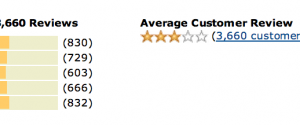 Via Bits Blog, an academic study on deceptive reviews explores why web reviewers make up bad things. It turns out that false negative reviews are not written predominantly by competitors or disgruntled employees. These reviewers are often loyal customers who have made multiple purchases from the company — just not the product in question. Customers writing false reviews may be upset about a different transaction, see themselves as “self-appointed brand managers,” or be seeking social status and validation in a public forum.
Via Bits Blog, an academic study on deceptive reviews explores why web reviewers make up bad things. It turns out that false negative reviews are not written predominantly by competitors or disgruntled employees. These reviewers are often loyal customers who have made multiple purchases from the company — just not the product in question. Customers writing false reviews may be upset about a different transaction, see themselves as “self-appointed brand managers,” or be seeking social status and validation in a public forum.
The paper offers some recommendations for those designing business rules for review sites to consider:
- reduce social status ties to reviewing like “elite reviewer”
- stop reporting every user’s number of reviews
- make it more difficult to see all reviews by one reviewer
- require prior purchase of the product before writing the review
False reviews provide a terrific example of unintended consequences, like these unexpected benefits and perils of showing quantifiable metrics like a user’s number of reviews. Review sites are communities where human primate behaviors, as one colleague likes to call them, tend to inflate rather than retract. It’s clearly worth investing time upfront in experience design to increase the likelihood of legitimate reviews, and ongoing analytics to spot the trends surrounding the deceptive ones. You might want to leave just a little room for gaming the system, though: the 4,288 reviews of the Hutzler 571 Banana Slicer are priceless.
